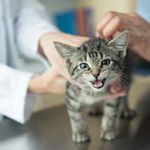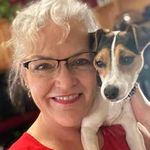BY THE NUMBERS - REPORT FOR VETERINARY SCHOOLS - SETTING A HIGHER STANDARD TOGETHER
←
→
Page content transcription
If your browser does not render page correctly, please read the page content below
Letter to Our Stakeholders
As we share highlights in this 2020 By the Numbers report, it’s difficult to even
recall anything before Covid-19. The impact of this unprecedented time is significant
and lasting. From the continued change in NAVLE testing, to the transition to remote
proctoring options for the VEA, adversity was no match for our dedicated veterinary
community.
Through these efforts, ICVA remains on a strong path forward to be the world Dr. Karen Robertson
leader in veterinary assessments and to provide world-class examinations and other
assessment tools to protect the public, and animal health and welfare.
In the midst of a global pandemic, complete with challenges and uncertainty, we
remain thankful – to our tenacious volunteers, to our outstanding staff, to our
hard-working stakeholders in academia, candidates and to the entire veterinary
community. The solidarity of people helping each other through hard times shows
the extreme commitment of the entire team.
Dr. Heather Case
Karen Robertson, Heather Case,
DVM, DACVPM DVM, MPH, DACVPM, CAE
ICVA Chair Chief Executive Officer
ICVA VISION
The world leader in veterinary assessments.
ICVA MISSION
Provide world-class examinations and other assessment tools to protect the
public, and animal health and welfare.
Provide leadership and facilitate collaboration throughout veterinary medicine.
VALUES
Transparency Integrity
organizationally and in testing procedures, materials in all actions and business relationships
and content
Fiscal Responsibility
Confidentiality to ensure continuous improvements in our testing products
when collecting and reporting personal information, and customer service, as well as a viable future for our
credit card data, and test scores organization
Reliability Diversity and Inclusion
in relevant test design, implementation, and scoring treat everyone with fairness, respect and dignity, and
purposefully act to attract and retain staff and Board members
Service with a broad range of ideas, viewpoints, perspectives, expertise
to candidates, licensing boards, and society at large
and experiences reflecting the diversity of the populations we
Respect, Civility & Collegiality serve. We respect and value these differences and encourage
towards staff, stakeholders, board members, and across opportunities to learn from and be enriched by them as they
veterinary medicine challenge us to grow and think differently.
1North American Veterinary Licensing
Examination (NAVLE ) ®
Administered since 2000, the NAVLE consists of 360 clinically relevant multiple-choice
questions and is a requirement for licensure to practice veterinary medicine in all licensing
jurisdictions in the US and Canada.
Developed in collaboration with the National Board of Medical Examiners® (NBME®), the
NAVLE is offered at Prometric computer testing centers throughout North America and
certain overseas sites.
Cumulative Exam Completions by Candidates
6,159
candidates took
79,885
candidates completed the
11.5%
increase in candidate pool
the NAVLE* NAVLE since 2000-2001 in the last five years
*Represents a slight decline from the 6173 candidates who tested during the 2018-2019 testing cycle. This decline was due to the
substantial number of candidates who deferred from the April 2020 testing window because of the COVID-19 situation.
Performance Data Ultimate Performance
Passing Rate
Complete data can be found here on our
website by clicking on the heading “How for senior students from AVMA-accredited
have others done on the NAVLE”: schools
®
NAVLE
https://www.icva.net/faqs/
NAVLE Fees 95% 2019-2020
2018-2019 94%
The ICVA NAVLE application fee is
$690 U.S.D. for candidates to take the
test. For those who want to take the
NAVLE at selected Prometric Testing
Centers outside of the U.S. or Canada,
there is an additional $330 U.S.D. % passing the exam remains relatively
overseas testing fee. consistent for the past five years
2COVID-19 RESPONSE
The ongoing COVID-19 pandemic resulted in several changes to the Spring and
COVID Fall 2020 NAVLE administration. As COVID-19 policies and guidelines were
released, and continued to rapidly evolve, the ICVA worked hand-in-hand with the
National Board of Medical Examiners® (NBME®) and Prometric Testing Centers to
make informed decisions regarding testing.
KEY CHANGES:
Extended Exam Completion Options for Candidates Opportunity to Defer
The NAVLE is typically offered twice a year – during a four- ICVA also provided candidates with an option to defer to the
week window in November-December, and again during a expanded September – December 2020 testing window
two-week window in April. This provides most candidates with no additional fee. Due to COVID-related Prometric site
two opportunities to pass the NAVLE before graduating from closures, an option was added for candidates to defer to the
veterinary school. March-May 2021 window if necessary.
In March 2020, as the scale and scope of Prometric Test Multiple Score Report Releases
Center closures began to increase, ICVA proactively gave all Normally, all scores for a testing window come out at once
current April 2020 NAVLE candidates an extension to complete on the same day about a month after the testing window
the exam by May 31, 2020. Once several governmental ends. For both of the 2020 NAVLE testing windows, scores
entities implemented longer closure times and stay-at-home were released on a monthly basis, with tests taken during
directives, ICVA lengthened the extension to June 30, 2020. each month reported approximately two weeks after that
Then, to further assist with candidate scheduling and test month ended, so candidates could complete the licensure
administration, ICVA announced all examinees with a current process and begin practice.
scheduling permit could take the NAVLE through September
30, 2020 – regardless of the country where testing.
NAVLE Standard Setting Panels
Standard Setting Exercise Best practices associated with standard setting:
n ach panel of participants is typically made up of
E
As examinations like the NAVLE receive ongoing updates, 5-15 SMEs with diverse demographic characteristics,
the passing standard -- the amount of knowledge required geological location of practice, years of experience and
veterinary medicine area of focus.
for passing -- is also periodically evaluated through a
Participants in the exercise should be guided by a practice
standard setting exercise to ensure that it continues to be
n
analysis, highly familiar with the nature of practice
relevant, valid, and defensible. Specifically, for the NAVLE,
being evaluated, collectively understand practice within
standard setting is the process by which expert judgment important specialty areas and have a stake in the pass/
and expertise about the tested content is mapped to the fail decisions to be based on test performance.
test score scale to describe how much content mastery is n A standard setting exercise is recommended on a
required for passing candidates. periodic basis to make sure the current passing rates still
represent the standard of minimal competency necessary
. for safe and effective practice.
Experts across a range of species Standard
30 3
For more information about the
NAVLE standard setting process, and competency specialties setting
please contact the ICVA.
participated in the exercises exercises
3NAVLE Self-Assessments
NAVLE practice exams (also known as NAVLE Self-Assessments) are web-based
examinations designed to help NAVLE candidates identify their strengths and
weaknesses as they prepare for the NAVLE. Each NAVLE self-assessment form consists
of 200 multiple-choice items, which are presented in four sections of 50 items each.
There are now 2 versions of self-assessments:
Regular and Expanded Feedback
English French
Form 1 Regular Form 1 Regular
Form 2 Expanded Feedback Form 2 Expanded Feedback
Form 3 Regular
$50
Regular
$65
Expanded Feedback
Self-Assessment Fee Self-Assessment Fee
The expanded feedback form allows the examinee to review the questions and
answers to incorrectly answered questions.
Research has confirmed that the projected score range for examinees who take
the practice exams under the standard-paced timing mode is predictive of later
performance on the NAVLE.
FREE Self-Assessments
Candidates were offered one FREE web-based NAVLE Self-Assessment (SA)
practice exam through December 31, 2020, as they prepared to take the test under
COVID
unprecedented conditions.
4Veterinary Educational Assessment (VEA)
Designed as an independent assessment of basic veterinary medical sciences
knowledge, the VEA is a 240-item web-based standardized examination.
The VEA is made available to veterinary schools to assess students’ knowledge
of subjects taught in the first two years of the curriculum of accredited veterinary
schools and to give them experience taking a standardized multiple-choice
examination.
The VEA covers five content areas:
Anatomy Physiology Pharmacology Microbiology Pathology
During the 2019-2020 testing cycle:
• n 1,601 students took the VEA over three testing windows at 12 schools, including three schools testing 143 candidates remotely
• n 4% increase over 2018-2019 testing cycle
• n 49.2% over the last five years
New VEA proctoring option was piloted in 2020 and remote
COVID proctoring started in May 2020.
VEA Research VEA Pool Review Meeting
Dr. Jared Danielson, Associate Dean for Academic and Student Twenty-seven subject matter experts met virtually on October
Affairs at the Iowa State University College of Veterinary 26-30, 2020 to review several hundred items from the
Medicine, completed a research study comparing internal VEA item bank. Assisted by test development staff from the
veterinary school assessments to students’ performance on NBME, these experts in anatomy, physiology, pharmacology,
the VEA and how well both measures predict clinical science microbiology, and pathology assessed the viability for continued
knowledge. This study differs from previous research conducted use of VEA test items in upcoming forms of the examination.
in 2011 in that it focuses on how students perform at school in
Drs. Case, Million, and Hecker from the ICVA staff also attended
the five major content areas the VEA tests: anatomy, physiology,
the sessions.
pharmacology, microbiology and pathology. Five schools are
participating in the study, with a data set totaling 4,750 students.
Findings from the research were initially set for release in early VEA Pool Review Participants: Drs. Lora Ballweber, Linda
2020, but with the COVID-19 situation, that window has been Berent, Daniel Brown, Stephen Cole, David Cross, Abdalla
pushed to 2021. Eljack, Tim Evans, Virginia Faji, Hilari French, Hari Goyal, Sagar
Goyal, Megan Jacob, Jennifer Ketzis, Judy Klimek, M. Cathleen
In the interim, Dr. Danielson and ISU’s Dr. Rebecca Burzette Kovarik, Brendan Lee, Martha Littlefield, Puliyur MohanKumar,
completed a paper discussing the use of undergraduate GPA and Sheba MohanKumar, Jeffrey Musser, Carly Patterson, Karen
GRE Verbal Scores to predict achievement on three important Russell, Wayne Schwark, Devendra Shah, Cathryn Sparks,
subsequent measures, including the VEA, NAVLE, and veterinary Michael Stonerook, T. Thippeswamy, and Maureen Wichtel.
GPA. Their work found significant positive relationships between
both predictors and VEA. This paper was published in the
Frontiers in Veterinary Science journal and can be accessed
here: https://www.frontiersin.org/articles/10.3389/
fvets.2020.576354/full
5Academic Veterinary Assessment Committee*
Assessment Tools and Resources
With the move to remote exams and the emphasis on online learning, ICVA’s Academic
Veterinary Assessment Committee curated a list of veterinary assessment resources. The
resource list is updated regularly as more resources are made available online:
https://www.icva.net/resources/assessment-resources/
Assessment Grant Program
“It’s imperative to look
In 2019, the Academic Veterinary Assessment Committee (AVAC) initiated the
at the landscape of ICVA Assessment Grant pilot program to fund research projects focused on veterinary
assessment practices to assessment within academia. The purpose of an ICVA assessment grant is to validate
determine what resource current, discover new, implement, and support best practices in veterinary medical
constraints exist and what education assessment.
is feasible and practical as The entry deadline for the second year of the Assessment Grant program was extended
we move forward. There to July 6, 2020. The ICVA received 6 letters of intent and from those letters of intent, the
is a tremendous AVAWG sent invitations for full proposals to all 6 applicants.
opportunity here
to build some really 2020 ICVA Assessment Grant Program Recipients
interesting, unique, vet
specific assessment
methodologies.” Dr. Carla Gartrell and her co-investigator, Dr. Abolfazl
Ghasemi, from Midwestern University, College of Veterinary
-- Dr. Kent Hecker, Medicine, “Longitudinal Tracking of Outcomes Assessment:
Chief Assessment Officer Growth Trajectories of Student Academic Success.”
of the ICVA
Dr. Sam Karpen, Director of Assessment at the University
of Georgia College of Veterinary Medicine, “Examining the
psychometric properties of virtual objective structured clinical
examinations (OSCE)s and how the move to online affects the
quality of the assessments.”
The 2021 Assessment Grant Program
April 1: Grant announcement and forms made available *The ICVA BOD voted to make the
May 1: Letter of intent Academic Veterinary Assessment
June 1: Full proposal invitation Working Group a standing ICVA
July 31: Deadline submission Committee at their August 2020
August: Application review BOD meeting.
® September: Applicants notified of award
P.O. Box 1356 | Bismarck, ND 58502 USA | 701.224.0332 | mail@icva.net
6You can also read



























































